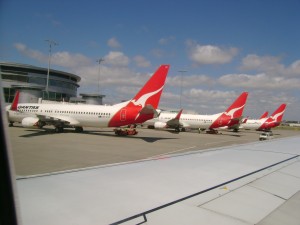By Nicholas Kralev
The Washington Times
April 5, 2010
Have you been accused by airline agents of trying to “game the system” by asking if they could open up for mileage redemption seats they obviously won’t sell for cash? Now a top airline executive is encouraging fliers to alert agents when the system fails in its predictability, so it can be “tweaked.”
Before you do that, however, make sure you know what you are talking about — learn all booking codes used by the respective carrier, if you haven’t already, and be able to access and understand its inventory data. Just because there are dozens of open business-class seats months before a flight doesn’t mean you are entitled to an upgrade or an “award” ticket.
Still, many frequent fliers have enough knowledge and experience to sense when the yield-management system — the computer software airlines use to predict how a flight will sell — is not working properly. The problem is that most agents are unreceptive when a customer points that out, saying they don’t tell inventory management what to do, because it knows best.
I don’t pretend to fully understand the intricate workings of airline inventory management, which is often compared to rocket science, and neither should you, unless you’ve done that type of work. But most airlines fine-tune the system when necessary, and their experts are unable to keep an eye on every scheduled flight, so an alert by a passenger can be helpful.
“Occasionally, we see flights that, for whatever reason, the system says will be sold, but the booking pattern shows that there is no way we’ll sell 40 seats in business class in the last seven days,” said Wally R. Mariani, senior executive vice president for the Americas at Australia’s Qantas Airways. “So then you intervene manually.”
In an interview, Mr. Mariani, who is based in Los Angeles, urged Qantas customers to call reservations and let agents know about possible failures of the system. If an agent dismisses you, ask them to read this column.
“Sometimes, you can’t rely on the yield-management system,” he said. “What we’ve found is that, by tweaking the system a bit — by having more people reviewing what the status of the flight is — we can do the job better.”
Deciding whether to open seats for upgrades and “award” bookings is a balance between “satisfying more of our customers and protecting the integrity of our yield,” he said. But he acknowledged that “there is also a benefit for an airline for customers to be able to burn miles, which are considered a liability.”
There are various reasons why the yield-management system may not work in some cases. After all, it tries to predict human behavior. Some of it is easily predictable — people tend to travel during spring break, summer vacation and family holidays. Flights to and from Washington are certainly popular on the days before and after a presidential inauguration or other major national events.
Other travel patterns, however, are hard to predict. For example, one of the factors in estimating how a flight would sell is that flight’s performance on the same date a year earlier. Although many carriers say that bookings in business and first class are picking up, selling those seats over the past year has been extremely difficult because of the global recession. So a flight that did well on Oct. 20, 2008, is likely to have done much more poorly on Oct. 20, 2009.
When you call reservations and alert an agent to a particular flight, don’t expect them to open up a seat immediately. In most cases, even a supervisor can’t do that. It’s much wiser to ask them to notify inventory management, which is the most appropriate department to make such decisions. Then keep an eye on the flight and grab a seat if one becomes available. Better yet, put yourself on a waitlist if possible.
I was recently waitlisted for an upgrade on a flight to Europe, and it hadn’t cleared two weeks before departure, even though two-thirds of the business-class cabin were empty. I asked a supervisor to alert inventory management — many would refuse but this one didn’t — and my upgrade cleared the next day. Moreover, the “rocket scientists” cleared the rest of the passengers on the waitlist and even opened up seven more seats for upgrades.
There is one other part of this game you should keep in mind. Most airlines overbook the coach cabin — some of them by dozens of seats on three-cabin wide-body aircraft — and they prefer to upgrade an economy passenger for free rather than give you a business-class seats for miles. In other words, they have decided that it makes better financial sense for them to take the coach flier’s money — even though it could be thousands of dollars less than the cost of a premium seat on international flights — than to offload 100,000 or more miles from your account.
Of course, if you paid full business-class fare, you probably would be annoyed that someone whose ticket cost 10 times less than yours ended up in your cabin, but that’s a topic for another column.
This column was first published by The Washington Times

